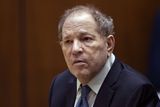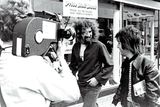The Producers... The A-Listers putting themselves in the picture
Reese Witherspoon's career was on the slide until she took control. Leonardo DiCaprio uses his fame and financial muscle to make powerful documentaries with a political message. And director Steve McQueen reckons the multi-Oscar winning 12 Years A Slave would not have even been made if it wasn't for Brad Pitt coming on board as a producer.
For Hollywood's A-Listers and coming stars, becoming a producer guarantees greater control over their careers, increased power and major financial benefits.
And for the studios, offering a star a production deal can often help lock them into multi-picture contracts, offering them an office, financing and the prestige that comes with having a production credit, often on their pet projects.
In a business where budgets and pay-cheques are shrinking and when it's becoming harder to get movies green-lit (especially if they are not obvious box-office bait), having a glamorous, big name producer can make all the difference.
Best Actor Oscar winner Chiwetel Ejiofor has no doubt about the influence Brad Pitt - as a producer and supporting actor - had in getting 12 Years A Slave to the big screen.
"I think the truth is we wouldn't have been able to make this film without Brad Pitt, because of what he brings," said Ejiofor. "He's a movie star. He's a huge figure in this profession, in this industry."
Pitt last year won both an Emmy and an Oscar for producing, confirming him as a major power-player in the wider industry. The actor has 34 producer credits, including films he has starred in, such as World War Z and The Assassination of Jesse James and films in which he has been an executive producer, such as Selma.
Pitt's Plan B production company has signed multi-series deals with TV channels and is currently finishing a six-part series based on the early-American explorers Lewis and Clarke, which will air on National Geographic channel next year (it stars Casey Affleck and Matthias Schoenaerts as the famed explorers).
Plan B has already become a big player in TV and film and Pitt is also said to be working on a major new TV project with actor/producer Ed Norton.
Leonardo DiCaprio has combined acting with a producing role. He recently produced the Oscar-nominated documentary Virunga and was the star and co-producer of The Wolf Of Wall Street.
And the salaries paid to the stars of that movie reveal just how important it is to have behind-the-scenes power as well as A-Lister status.
DiCaprio made $25 million (including bonuses) for The Wolf of Wall Street. His co-star Jonah Hill was paid just $60,000. This may be an extreme example, Hill offered the do the part for a basic rate - or "scale" - and got an Oscar nomination for his trouble. And no actor was going to turn down starring alongside DiCaprio in a Martin Scorsese movie, no matter how skinny the pay-packet.
But it is a telling snapshot of how Hollywood economics work in the current climate, where those with the star name and clout still command huge fees, but those a rung or two down - or without producer power - are seeing their salaries squeezed.
Becoming a producer can also be a way out of a career slump, as Reese Witherspoon has recently demonstrated.
After the Legally Blonde comedies and the Oscar-winning turn as June Carter Cash in 2005's Walk The Line, Witherspoon found her career badly stalled (a bizarre arrest after a drink driving incident involving her husband in 2013 only seemed to underline how far her star had fallen).
However, Witherspoon has since emerged as an influential and high-achieving producer, using her Type A production company to find stellar projects for herself and back one of the biggest movies of 2014, Gone Girl.
The actress starred in and produced Wild, adapted from Cheryl Strayed's best-selling memoir, winning an Oscar nomination for Best Actress. Witherspoon actually bought the rights to Gillian Flynn's Gone Girl novel before it had even been published, proving her ability to spot a winner and shoulder aside the heavy competition.
The Oscar-nominated Wild has - by itself - restored Witherspoon's status as a leading Hollywood actor after a very long run of duds and disappointments.
A string of lukewarm romances and underperforming comedies - Four Christmases, How Do You Know, Water For Elephants, This Means War - saw her bankability fade from the mid-noughties on.
And between 2008 and 2010, she only had one movie credit, as a voice in the animated comedy Monsters Vs Aliens.
The Witherspoon Blueprint for DIY Career Rebirth is now likely to be followed by other actors who have seen their star power fade.
Sean Penn has produced and starred in The Gunman, currently in cinemas. And he will shortly make his director debut with The Last Face, starring Robin Wright and Ryan Gosling. It's a project that Penn has been trying to get greenlit since the mid-noughties.
It's almost more difficult to name a Hollywood star who hasn't moved into producing in a big way in recent years, the likes of George Clooney, Kevin Spacey, Brad Pitt and Sean Penn all run their own thriving production companies looking to compete for what has been a shrinking pool of money.
And it is not a strictly new trend. In the golden age of Hollywood, major stars such as Humphrey Bogart set up their own production companies, Bogart was the lead actor/producer on the classic Treasure of the Sierra Madre.
Even further back, at the dawn of the movie-age, Charlie Chaplin, Douglas Fairbanks and Mary Pickford set up their own studio, United Artists, which thrived for decades.
In more recent times, Robert Redford has worked more on producing and directing, and currently has a slate of film and TV projects in development.
Of the current generation of big-name actors, it is perhaps DiCaprio who is looking to become the most powerful Hollywood figure of all, through his Appian Way company.
DiCaprio's outfit currently lists 36 film and TV projects "in development" and is busy buying up the rights to hot scripts, books and documentary ideas. The 40-year-old star has just signed a multi-million dollar "first-look" deal with the video-streaming service Netflix, which will give him direct access to 60 million subscribers globally.
DiCaprio's aim is to mix philanthropy with film-making and generate documentaries with topical themes and a powerful punch, focusing on environmental and conservation themes.
His Oscar-nominated documentary Virunga looked at the fight to save the last of the Congo's mountain gorillas and was streamed exclusively on Netflix. The attraction for DiCaprio is obvious. These worthy but challenging documentaries have traditionally played to small festival audiences.
By signing with Netflix, he reaches a global audience that most documentary producers and directors can only dream about.
And Netflix get to use the DiCaprio brand-name, buying prestige and ensuring that subscribers who might not necessarily be interested in a doc about mountain gorillas in central Africa have their interest piqued.
As Witherspoon, DiCaprio and other Hollywood stars are finding out, when it comes to getting a meeting with the money-men and studio chiefs, first names like Reese and Leo tend to magically open doors.
Join the Irish Independent WhatsApp channel
Stay up to date with all the latest news













